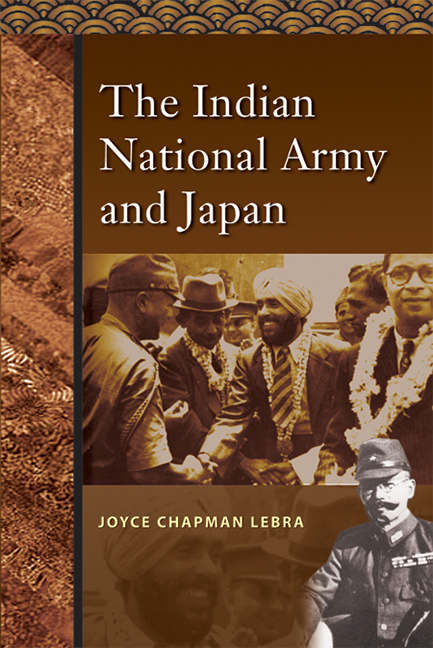Book contents
- Frontmatter
- Contents
- Illustrations and Maps
- Abstract
- Foreword
- Preface
- Acknowledgements
- Introduction
- 1 Mission to Bangkok
- 2 Malayan Jungle Meeting
- 3 Singapore Capitulates and the INA Blossoms
- 4 Tokyo Conference
- 5 Japanese Policy toward India
- 6 The Crisis of the First INA
- 7 Subhas Chandra Bose, Hitler, and Tōjō
- 8 Bose, the FIPG, and the Hikari Kikan
- 9 To India or Not?
- 10 The Rising Sun Unfurls; the Tiger Springs
- 11 A Plane Crash
- 12 A Trial in the Red Fort
- 13 Retrospect
- Notes
- Bibliographical Note
- Bibliography
- Index
- About the Author
7 - Subhas Chandra Bose, Hitler, and Tōjō
Published online by Cambridge University Press: 21 October 2015
- Frontmatter
- Contents
- Illustrations and Maps
- Abstract
- Foreword
- Preface
- Acknowledgements
- Introduction
- 1 Mission to Bangkok
- 2 Malayan Jungle Meeting
- 3 Singapore Capitulates and the INA Blossoms
- 4 Tokyo Conference
- 5 Japanese Policy toward India
- 6 The Crisis of the First INA
- 7 Subhas Chandra Bose, Hitler, and Tōjō
- 8 Bose, the FIPG, and the Hikari Kikan
- 9 To India or Not?
- 10 The Rising Sun Unfurls; the Tiger Springs
- 11 A Plane Crash
- 12 A Trial in the Red Fort
- 13 Retrospect
- Notes
- Bibliographical Note
- Bibliography
- Index
- About the Author
Summary
THE MAKING OF A REVOLUTIONARY
On 23 January 1897 at Cuttack, Orissa, was born Subhas Chandra Bose, ninth child of Janakinath and Prabhavati Bose. Janakinath was a lawyer of a Kayastha family, and was wealthy enough to educate all his children well. By Indian standards this family of Bengali origin was well-to-do. Janakinath was raised in the atmosphere of the nineteenth century reform movements of Bengal through which English social reformist thought filtered into India. He had resigned posts within the bureaucracy of the British Raj in protest against its repressive policies. Bengal was at the same time the funnel for new ideas from the West and the province which felt most keenly the oppressive hand of the British. It was natural that Bengal nurtured leaders of the stature of Rammohan Roy, Keshab Chandra Sen, Rabindranath and Debendranath Tagore, and Bankim Chandra Chatterji.
At the age of five Subhas was enrolled in a school for European and Anglo-Indian boys run by the Baptist Mission. Subhas and his brothers and sisters were all admitted as part of a small quota for Indians. For a Bengali child of the late nineteenth century learning English was one of the first requisites of life. The curriculum also included Latin and the Bible. The school might almost have been in London rather than Cuttack, for the teachers were also British. Sanskrit, India's classical language, and Bengali, the language of Bose's family, were neglected. Subhas spent seven years of his life in this English public school.
In 1909 Subhas entered a public school in Cuttack, Ravenshaw Collegiate School. Here he recalls being laughed at by his fellow students because he knew so little Bengali. At the age of fifteen Subhas first read the works of Vivekananda and found a goal for his life —spiritual salvation for oneself and service to humanity. Subhas began to practise yoga. From Vivekananda Subhas's quest took him to Ramakrishna and the ideal of renunciation. He continued his meditations. Subhas felt his religious life was more important than his studies.
At the age of sixteen Subhas was sent off to the Presidency College in Calcutta and began to make decisions apart from his family. He joined a group of students who wanted to bring about a fusion between religion and nationalism.
- Type
- Chapter
- Information
- The Indian National Army and Japan , pp. 102 - 127Publisher: ISEAS–Yusof Ishak InstitutePrint publication year: 2008



